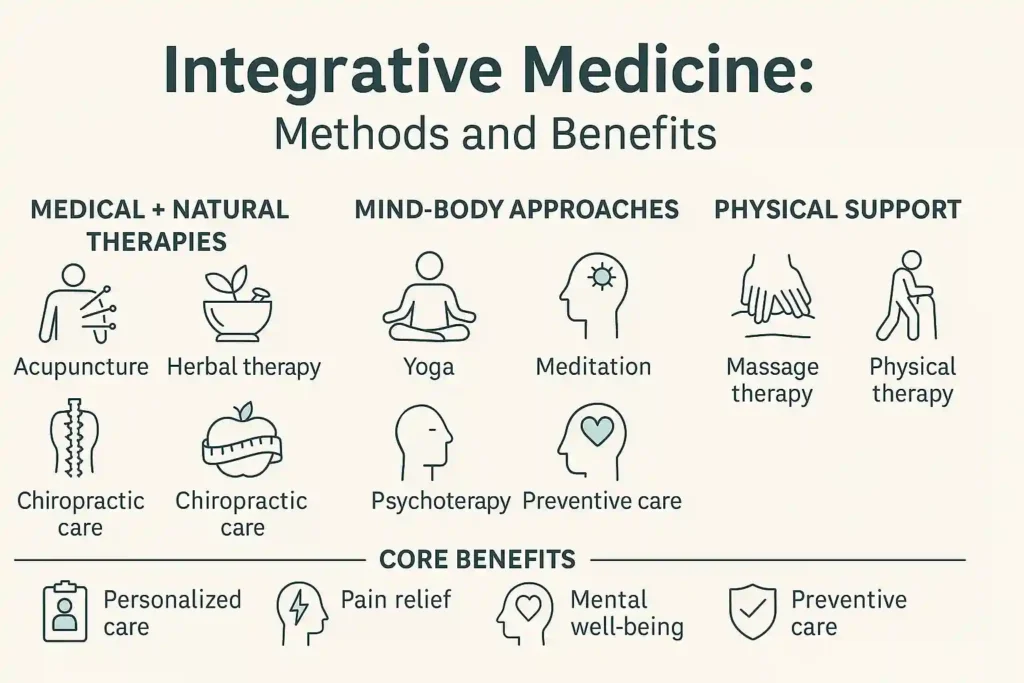What Is Integrative Medicine?
Integrative medicine is a care model that blends science-backed treatments from modern healthcare with safe natural therapies. Instead of treating only your symptoms, it focuses on the root causes. It connects the body, mind, and lifestyle in one complete care system.
Table of Contents
ToggleIn simple terms, integrative medicine uses both medications and natural approaches, like diet, stress relief, and exercise. It’s not about choosing between the two. It’s about using both when needed.
Integrative health looks at how sleep, stress, emotions, and habits affect your body. This is different from old ways that only focus on disease. The goal is to treat you as a whole person, not just a patient with a problem.
What Type of Providers Deliver Integrative Medicine?
Care teams in integrative medicine often include many types of experts. These may be:
- Family doctors or specialists trained in integrative healthcare
- Nutritionists
- Psychologists
- Physical therapists
- Yoga instructors
- Practitioners of herbal medicine, massage, and more
Each of them focuses on patient-centered care. That means listening carefully and working with you to build a health plan that fits your body and lifestyle.
How Can Integrative Medicine Help Me?
If you have stress, pain, sleep issues, or a long-term condition, integrative medicine can help you manage your symptoms better. It gives you more options—like acupuncture for pain or guided breathing for anxiety.
It’s not just about getting better today. It’s about staying well tomorrow. This approach often includes:
- Natural ways to boost energy
- Tools for pain relief without drugs
- Better sleep habits
- Help for depression and anxiety
Integrative health often improves both mental and physical well-being. It supports long-term care without relying only on pills or surgery.
Who is Integrative Medicine For?
Everyone. Whether you’re healthy or facing a serious illness, integrative health can fit into your care. It’s especially useful for:
- People with chronic pain or fatigue
- Cancer patients looking for added support
- Those seeking stress reduction techniques
- People wanting a deeper mind-body connection
Even if you’re not sick, it can help you stay well. Many people use it for preventive healthcare, to avoid problems before they start.
Treatment Details

What Types of Integrative Medicine Are Available?
Integrative medicine includes many therapies. They are often used alongside your regular medical care to boost healing and comfort.
Acupuncture
Acupuncture is a form of care that uses tiny needles placed at specific points on your body. It’s part of traditional healing practices from ancient China. These needles help improve blood flow, ease muscle tension, and reduce pain.
Many people use acupuncture for headaches, back pain, or even to relax. It’s a safe and natural way to support healing, especially when done by trained experts.
Chinese Herbal Therapy
This therapy uses natural plants to support your body’s healing. Each herbal medicine blend is made to fit your specific needs. Herbs can help with digestion, energy, stress, or sleep.
In integrative medicine, these herbs are used alongside regular treatment. It’s important to work with a trained herbalist to avoid side effects or mixing with your medications.
Chiropractic Therapy
Chiropractic therapy focuses on the spine and joints. If you have back pain, neck pain, or stiffness, a chiropractor uses gentle hand movements to realign your body.
This can improve posture, reduce nerve pressure, and help the body move better. It’s a natural tool that supports your body’s own healing process.
Culinary Medicine
Culinary medicine teaches how food can act like medicine. You learn to eat meals that fight disease, reduce inflammation, and boost energy.
Doctors trained in this area help you build healthy eating habits. It’s a big part of nutritional therapy and works well for heart health, weight control, and blood sugar.
Holistic Psychotherapy
Holistic psychotherapy supports emotional health. It includes talk therapy, breathing tools, and body awareness.
It helps with stress, anxiety, and trauma. This form of therapy looks at the whole person, not just the symptoms so you feel heard, safe, and supported.
Massage Therapy
Massage therapy is more than just relaxing. It helps reduce pain, improve sleep, and ease stress.
By working on muscles and soft tissues, massage boosts blood flow and helps the body recover from injuries. It’s a key part of many integrative health plans.
Reiki
Reiki is a gentle energy therapy. Practitioners use light touch or hold their hands near the body to support calm and balance.
While it may sound simple, many people feel deeply relaxed afterward. It’s often used for stress, grief, or emotional healing.
Yoga and Tai Chi
Both yoga and tai chi use slow movements, deep breathing, and focus. They help improve strength, balance, and flexibility.
These practices also calm the mind, which supports the mind-body connection. They’re used often in integrative health for stress, pain, and overall wellness.
Risks / Benefits
What Are the Benefits of Integrative Medicine?
The biggest benefit of integrative medicine is balance. It treats more than just symptoms, it supports lasting health.
Here’s what it offers:
- Fewer side effects from drugs
- More control over your healing
- Relief from pain, anxiety, or fatigue
- Stronger immune function
- Personalized care for long-term health
It supports functional medicine, which means solving health issues at the root, not covering them up. It also helps with lifestyle changes that build lasting strength.
What Are the Risks of Integrative Medicine?
Most therapies are safe when guided by trained professionals. But there are some things to consider:
- Some herbs or supplements may react with your medications
- Not every therapy has strong science behind it
- Doing these therapies without guidance may delay needed treatment
That’s why it’s important to work with certified providers who understand both modern and evidence-based alternative medicine.
Recovery and Outlook
What Is the Outlook for People Receiving Integrative Medicine?
People who use integrative medicine often feel more in control and satisfied with their care. They report:
- Better sleep
- Improved mood
- Less pain
- Stronger energy
This approach supports steady healing, not just quick fixes. It strengthens the connection between your choices and your body’s response. The result is a healthier, more balanced life.
For people with long-term issues, integrative health offers tools that work day after day, not just during flare-ups.
When to Call the Doctor
When Should I Contact My Healthcare Provider About Integrative Medicine?
Reach out to your doctor if you:
- Want to explore options beyond pills or surgery
- Are not getting full relief from your current plan
- Want to try yoga, acupuncture, or nutrition-based support
- Are interested in lifestyle medicine or personalized medicine
Your provider can help you combine these tools with regular care. That way, your treatment is safe, guided, and effective.
Conclusion
Integrative medicine is not a new idea. It’s a smarter way to care for your health, by blending old wisdom with new science.
When conventional medicine and holistic approaches work together, the results are stronger. You get access to more tools. You feel heard. You take part in your healing.
If you’re tired of one-size-fits-all answers, integrative health may be your next step. It offers a full view of your well-being, body, mind, and daily life.
It’s not just about fixing what’s broken. It’s about staying well, every single day.
FAQs About Integrative Medicine
What is the meaning of integrative medicine?
Integrative medicine combines modern medical treatments with safe natural therapies to treat the whole person focusing on long-term healing, prevention, and overall well-being.
What’s another word for integrative medicine?
Another word for integrative medicine is complementary and alternative medicine (CAM) or whole-person care, depending on the setting. It’s also called Integrative Health in many clinical practices.
What are the methods of integrative medicine?
Common methods include acupuncture, massage, herbal therapy, nutrition counseling, yoga, meditation, chiropractic care, and psychotherapy, used along with medical treatments to improve healing and overall health.
Is yoga an integrative medicine?
Yes. Yoga is part of integrative medicine. It improves strength, balance, and mental focus, while reducing pain and stress. It’s often used for both physical and emotional wellness.
What is the main goal of integrative medicine?
The main goal is to treat the entire person using both medical and natural tools to support healing, improve quality of life, and prevent future health problems.
What are the barriers to integrative medicine?
Barriers include limited insurance coverage, lack of provider training, public misunderstanding, and access issues. Some people also hesitate due to unfamiliar therapies or unclear scientific support.
What are the other names for integrative medicine?
Other names include functional medicine, personalized medicine, whole-person care, and evidence-based alternative medicine. These terms reflect its focus on combining treatments tailored to each individual’s full health needs.

This article is medically reviewed by Dr. Chandril Chugh, Board-Certified Neurologist, providing expert insights and reliable health information.
Dr. Chandril Chugh is a U.S.-trained neurologist with over a decade of experience. Known for his compassionate care, he specializes in treating neurological conditions such as migraines, epilepsy, and Parkinson’s disease. Dr. Chugh is highly regarded for his patient-centered approach and dedication to providing personalized care.








